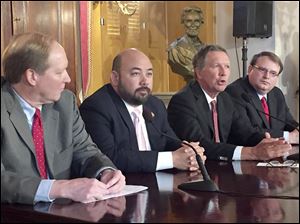
NET TAX CUT UNLIKELY
Kasich, GOP agree to cut budget $800M
4/14/2017
COLUMBUS — Gov. John Kasich and Republican legislative leaders on Thursday agreed to reduce Ohio’s spending by $800 million in the next two-year budget, making an already tight plan even tighter.
Mr. Kasich’s hope to include a fourth consecutive net tax cut is in danger.

Budget Director Tim Keen, House Speaker Cliff Rosenberger (R., Clarksville), Gov. John Kasich, and Senate President Larry Obhof (R., Medina) talk about cuts to the proposed next two-year state budget.
“I believe you can have an income tax cut based on tax reform,” he said. “That means some [taxes] go up and others go down. … I would still like to see the income tax go down, but this is going to be something that’s a challenge for the legislature. But in terms of a net tax cut, it is unlikely that that will remain.”
For the first nine months of the fiscal year ending June 30, Ohio has collected $614.6 million, or 3.7 percent, less than projected. That’s largely because of personal income taxes down by a whopping $447.7 million, or 7.6 percent, to date.
The state still expects to finish the current year in the black because spending is also well below projections so far — $898.8 million, or 3.3 percent, less. A big chunk of that, $871.5 million, is from lower-than-expected Medicaid spending.
The state also built in a cushion of more than $400 million at the start of this budget — just in case.
But the dismal numbers for this fiscal year cast a shadow over debate about what was projected to be a $66.9 billion two-year budget that will take effect on July 1.
The leaders have agreed to now reduce that by $400 million a year.
The governor, House Speaker Cliff Rosenberger (R., Clarksville), and Senate President Larry Obhof (R., Medina) sought to present a united front now rather than wait to be given downward revenue numbers by budget Director Tim Keen just before finalizing a budget in June.
Mr. Rosenberger said lawmakers could restore funding later if revenues rebound.
The trends could prove troublesome for school districts. Mr. Kasich had proposed 3.2 percent more for education overall, but about two-thirds of districts would have seen cuts under a revised distribution formula.
Colleges and universities were already looking at small increases while being told to hold the line on tuition.
None of the leaders suggested where they’ll make $800 million in cuts.
“We’re not going to write the budget here, even though you’d like us to do it,” Mr. Kasich said.
While the general fund, fueled largely by tax revenues, will likely remain flat over the next two years, the all-funds budget that also factors in federal funds and fees will see slight growth.
The Kasich administration largely blames a sluggish state and national economy, slower-than-expected payroll-tax withholding, and bigger-than-expected tax refunds. While slow, Mr. Kasich said job growth is still happening, adding to the 460,300 created since he took office.
Democrats, however, counter that the effects of $5 billion in income-tax cuts over the past six years are coming to roost without the good-paying jobs they were supposed to help create.
“While the newly proposed budget cuts are understandable on some level, the lagging tax revenues pale in comparison to the billions of dollars in tax cuts that Republicans have handed the wealthy,” state Sen. Edna Brown (D., Toledo) said. “There is never enough for everything, but it is now a question of priorities. I urge the governor to prioritize looking out for our children and working Ohioans before special interests.”
The state is sitting on budgetary reserves of more than $2 billion, but Mr. Kasich doesn’t want to tap it at this stage.
“We don’t think you use a rainy day fund to write a budget,” he said. “The rainy-day fund should be used in the middle of the year to put out fires.”
Mr. Kasich had proposed a small net tax cut, but that counted on lawmakers offsetting much of that bill by raising sales taxes half a cent, expanding that tax’s base to a handful of professional services, and hiking taxes on tobacco, alcohol, and shale oil and natural gas.
Contact Jim Provance at: jprovance@theblade.com or 614-221-0496.